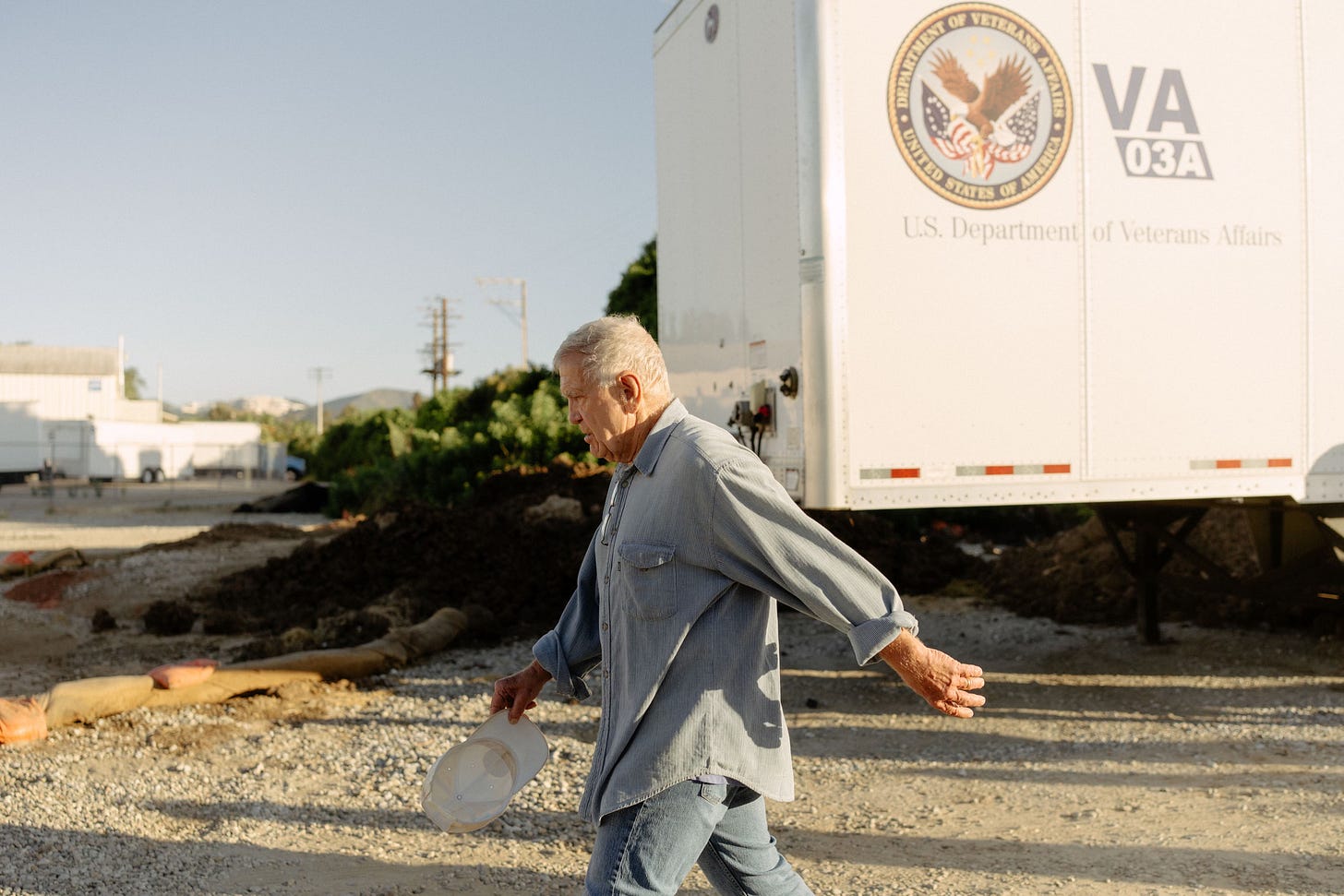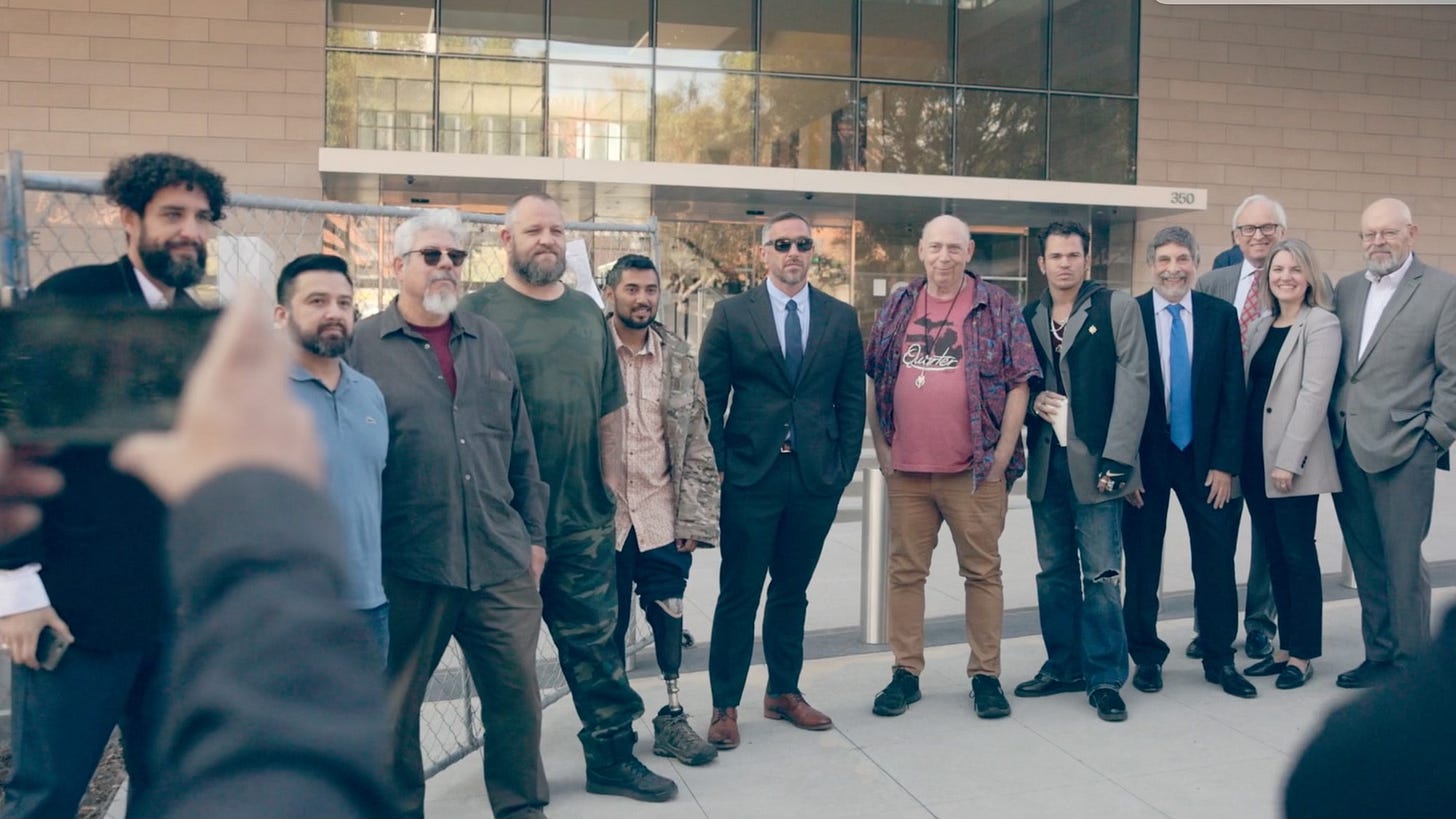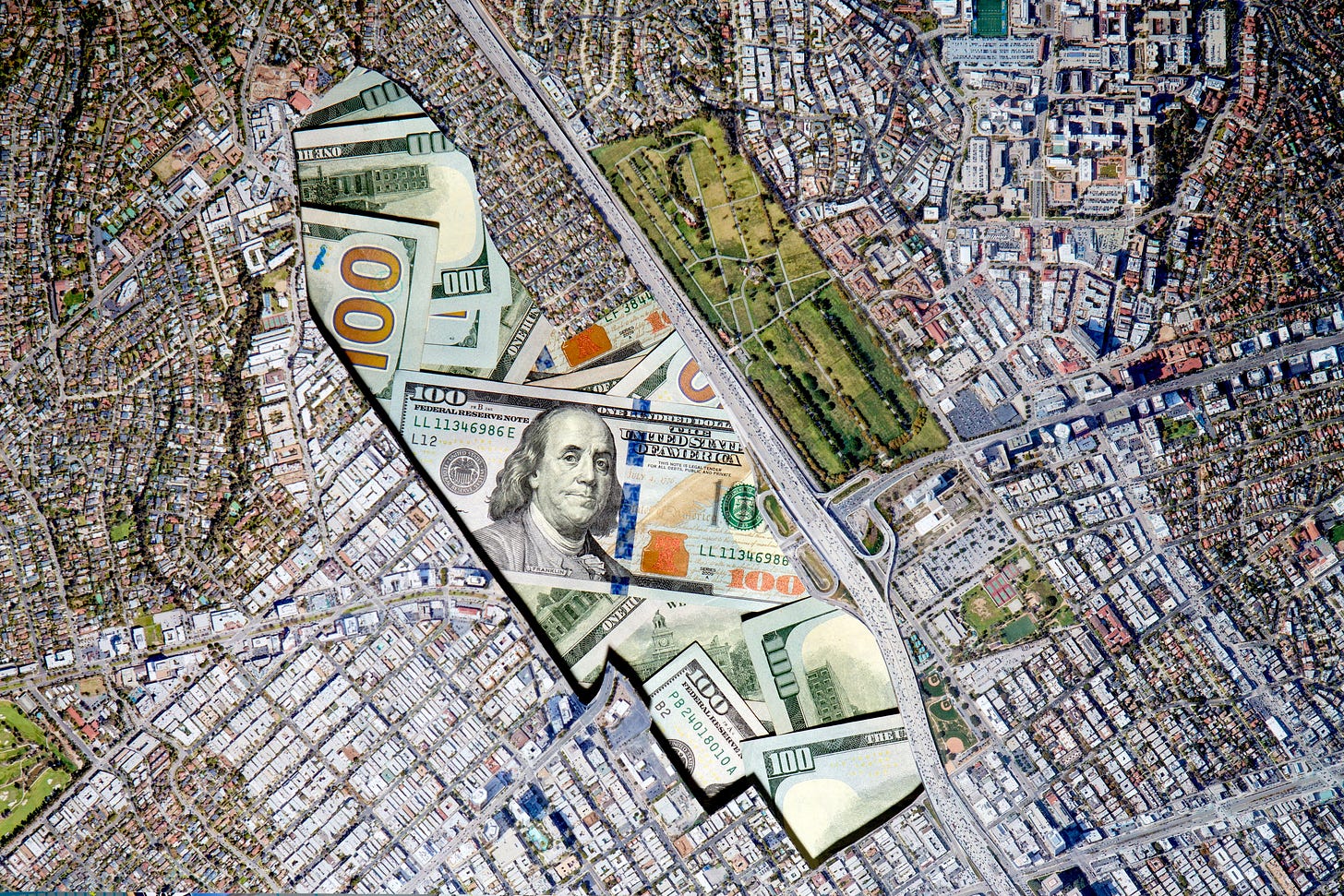In homeless veterans’ lawsuit appeal, court weighs “incapable” VA against a judge acting like a “king”
The three-judge panel questioned potential overreach by the district court, while also lamenting the VA's historic shortcomings in combating LA's homeless veteran crisis.

A three-judge panel of federal appeals judges ripped the VA for squandering potential benefits for homeless disabled veterans and their families through mismanagement of housing and leasing on its West LA campus on Tuesday morning at the U.S. Court of Appeals for the Ninth Circuit in Pasadena, California.
“When I look historically from when (the campus) came in the first place, it’s really hard to say that the VA has done a good job,” said Judge Consuelo Callahan during two hours of lively legal arguments over the VA appeal of Judge David O. Carter’s landmark judgment in September that ordered the agency to change how it handles veteran homelessness.
But Callahan also questioned whether Carter may have overstepped by appointing himself “king” of housing development on the VA’s sweeping property.
“I guess Judge Carter basically said that he’s going to run the VA now because you’ve done such a bad job, right?” Callahan told Department of Justice lawyer Daniel Winik. “I think somewhere, a long time ago, (the courts) decided we were going to run the prisons, and I don’t know how that’s worked out. So I guess the remedies here are what cause me concern, the reach of what Judge Carter has done.”
VOTE: Home of the Brave needs your support
Home of the Brave, a seven-part, multimedia explainer on Los Angeles’s homeless veterans crisis, is up for a Webby Award and Long Lead needs your help to win it. It is being considered as the year’s “Best Editorial Feature” but is up against some strong competition. News features from CNN, Cosmopolitan, NBC News, and Reuters were also nominated — and they’re beating us.
Winning this prize is important not just because Home of the Brave is worthy, but moreso because the cause of veteran homelessness needs more eyes on it. Being honored with a Webby Award would help bring this issue to an international stage. So please, click here to vote for Home of the Brave.
Also: For your vote to count, you must confirm it via an email the Webby Awards sends after you cast your ballot. So please dive back into your inbox to confirm! Thank you for your support — and your vote!
The government’s appeal comes after Carter’s September order for the VA to build thousands of temporary and permanent housing units on its sweeping campus between Brentwood and the UCLA campus. Homeless veterans accuse the agency of denying them meaningful access to medical care by leaving them on the streets and slow-walking housing development on the property, which was donated to the federal government in 1888, specifically to be used as a home for disabled soldiers. Veterans say specialty treatments for PTSD, traumatic brain injuries, and serious mental illness are only available at the West LA VA Medical Center.
Carter also struck down leases the VA had granted UCLA for its baseball stadium, Brentwood School, a private K-12 academy, for its state-of-the-art athletic facilities, and Bridgeland Resources LLC for a slant drilling operation.
The West LA VA campus housed 5,000 veterans in the late 1950s, but veterans were evicted from housing after a 1971 earthquake posed safety issues to its buildings, just as post-Vietnam War veteran homelessness exploded. At last count, nearly 3,000 veterans were unhoused in LA, although advocates believe January’s urban firestorms in Pacific Palisades and Altadena likely pushed up the numbers considerably. The VA has opened just 379 of 1,200 housing units promised by 2030 in a 2015 court settlement with veterans in a prior legal action.
Get the whole story: An epic government scandal hiding in plain sight
Home of the Brave is an award-winning, multimedia feature documenting the unhoused veteran crisis at the West LA VA campus, a 388-acre property deeded to the U.S. government in 1888 specifically to house disabled soldiers. Over the last 50 years, the land was carved up and leased to private interests, while development for veteran housing has been painfully slow. A land grab dating back to the U.S. Civil War, the history of this land is a story bursting with government malfeasance, neglect, graft, and even death.
This newsletter reports on how veterans are fighting to reclaim the land through Powers v. McDonough, a class-action lawsuit filed against the Department of Veterans Affairs. Get updates on the case here:
The VA’s appeal was filed by the Biden administration, but has been taken up by President Donald Trump, whose Department of Justice brought on Deputy Assistant Attorney General Yaakov M. Roth last month. Roth, a Federalist Society lawyer with extensive appellate experience, last week defended the administration’s wrongful treatment of Kilmar Armando Abrego Garcia, a Salvadoran migrant with protected status in the U.S. deported to a notorious prison in El Salvador.
Several former military leaders including retired Admiral William H. McRaven, who oversaw the 2011 Navy Seal raid that resulted in Osama bin Laden’s death, oppose the VA’s appeal. In a friend of the court brief, the retired high-ranking leaders called the VA’s neglect of homeless veterans “a direct threat to national security.”
Their filing, also signed by retired Gen. Peter W. Chiarelli, head of combat operations in Iraq; retired Admiral Michael G. Mullen, chairman of the joint chiefs of staff for presidents George W. Bush and Barack Obama, and retired Col. David W. Sutherland, former special assistant to the chairman for warrior and family support, said potential recruits fear injuries including PTSD and traumatic brain injuries could lead to homelessness.
“When I look historically from when (the campus) came in the first place, it’s really hard to say that the VA has done a good job.” —Judge Consuelo Callahan
Attorneys for UCLA, Brentwood School and Bridgeland Oil Resources were also in court defending their leases, which the West Los Angeles Leasing Act of 2016 mandated must “predominantely” benefit veterans.
Attorney Raymond A. Cardozo, representing the Regents of California, argued UCLA’s medical care and research collaborations with the VA justified the university stadium’s presence as part of the university’s “predominant” campus focus on veterans.
Brentwood School said it was committed to a preliminary settlement that offered veterans greater access to its athletic facilities and more money. The settlement was aborted before it was finalized when the VA appealed Carter’s judgment.
Callahan, an appointee of President George W. Bush, said Brentwood School’s compensation to date appeared of dubious value. “When I look at one of the schools that they say they let them use the pool… it was almost like there’s one minute in the day when you could actually get where that could work,” Callahan said. ”I struggle with how some of the things that the VA did benefited veterans at all.”
Carving up the map
After prohibiting veterans from living permanently on land donated to house them, the VA entangled itself in a wild array of leases on the valuable Los Angeles property — from soccer pitches to parrot sanctuaries — inhibiting the government from solving a homeless crisis of its own creation.
If the VA isn’t housing veterans on this land, what is the property being used for? Learn more by reading Part Four of Home of the Brave.
Much of the VA’s argument turned on whether the 1888 deed imposed a duty on the agency to build veteran housing, and whether any obligation was enforceable by the courts.
Department of Justice lawyer Daniel Winik, for the VA, conceded the agency “hadn’t always lived up to its obligations” but said veterans would have to bring their claims individually through the agency’s administrative benefits system, not the federal courts.
The judges, who also included Ana de Alba and Roopali Desai, both Biden appointees, asked if the West Los Angeles Leasing Act, which set out a campus housing master plan, established the VA’s duty to house homeless veterans on the property. de Alba also asked whether the VA had studied if veterans wanted to live on campus.
Winik said he didn’t know if veteran preferences had been studied, but argued Carter had outrun the limits of his authority. Winik said the VA had made good progress, not only in building housing for homeless veterans on campus, but through other VA programs including enhanced rental vouchers.
Watch: “The Promised Land”

In the documentary short “The Promised Land,” Bronze Star Army veteran and documentary filmmaker Rebecca Murga provides an unflinching look at LA’s homeless veteran crisis, letting unhoused heroes provide a street-level view of what life is like when your government leaves you behind. Learn more about these veterans, their lives, and their struggles, watch “The Promised Land” today.
Mark Rosenbaum, representing the veteran plaintiffs, argued Carter had limited his scope by calling for housing units only as needed, determined in collaboration with the VA, although he agreed the judge would have the final word. Rosenbaum called the VA rental voucher system “a tragedy” and suggested neither UCLA nor the VA had responded to the “urgency” of veteran homelessness.
“During the height of the pandemic, when the veterans pleaded to put housing on the [stadium] parking lot, UCLA said no — it was for baseball,” Rosenbaum said.
Several of the judges, citing another part of Carter’s order barring all slant drilling by Bridgeland, also suggested the judge may have overreached. Callahan said she was thinking of how the case might be received at the Supreme Court, where overly broad injunctions have been an issue.
“My concern is this is possibly coloring outside the lines and too broad,” she added.
“We disagree respectfully that the district court is attempting to run the VA,” said Mark Priebe, another lawyer for the veteran plaintiffs.
“You can make your arguments,” Callahan replied. “If you get to be the ultimate decision maker, you’re running it… he’s still the king or the superintendent.”
“Because the VA has been incapable of making decisions on its own for the past 50 years,” Priebe added.
Callahan closed the hearing before noon, thanking the parties for their “very helpful arguments.”
Former Santa Monica Mayor Bobby Shriver, a Hollywood producer and member of the Kennedy clan who helped instigate the long legal battle with the VA, was in the courtroom and said later the VA should have settled instead of dragging homeless veterans back to court again.
Veteran and advocate Rob Reynolds also attended the hearing. “It’s really shameful that the VA is continuing this 50-year battle against housing veterans on the land,” he said.
A ruling is expected some time before summer.








